Charles E W Bean, Diaries, AWM38 3DRL 606/116/1 - June - September 1918 - Part 11
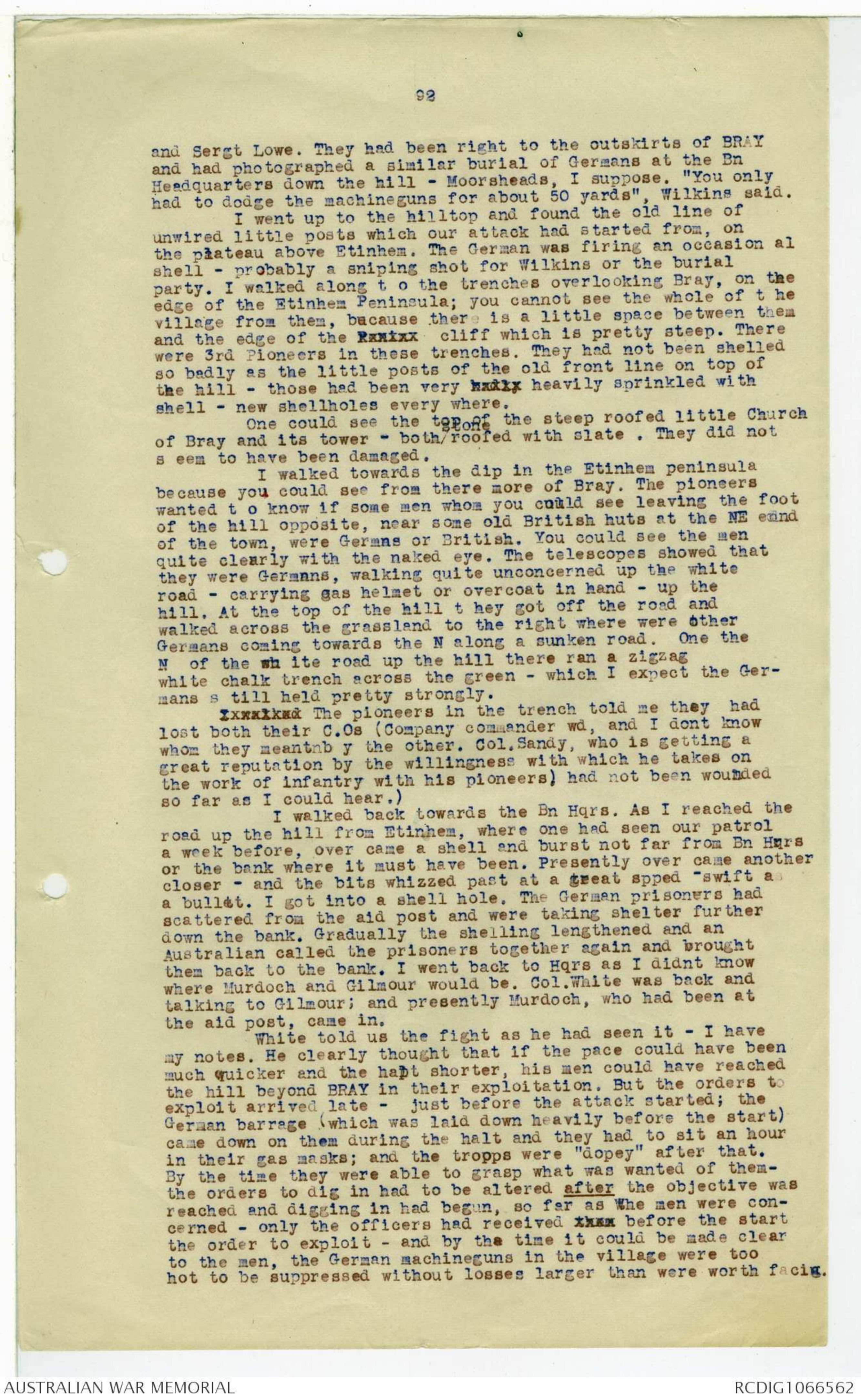
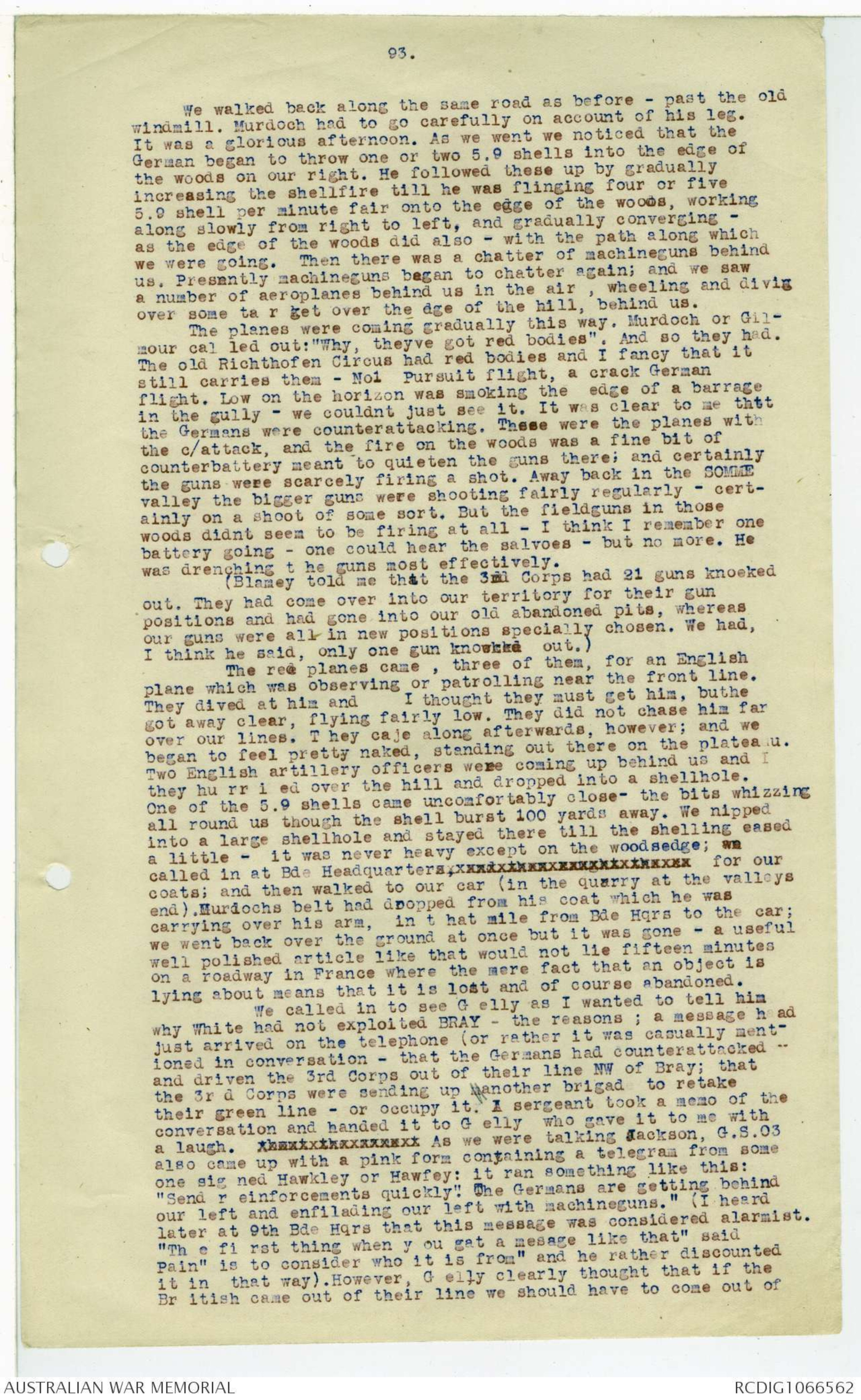
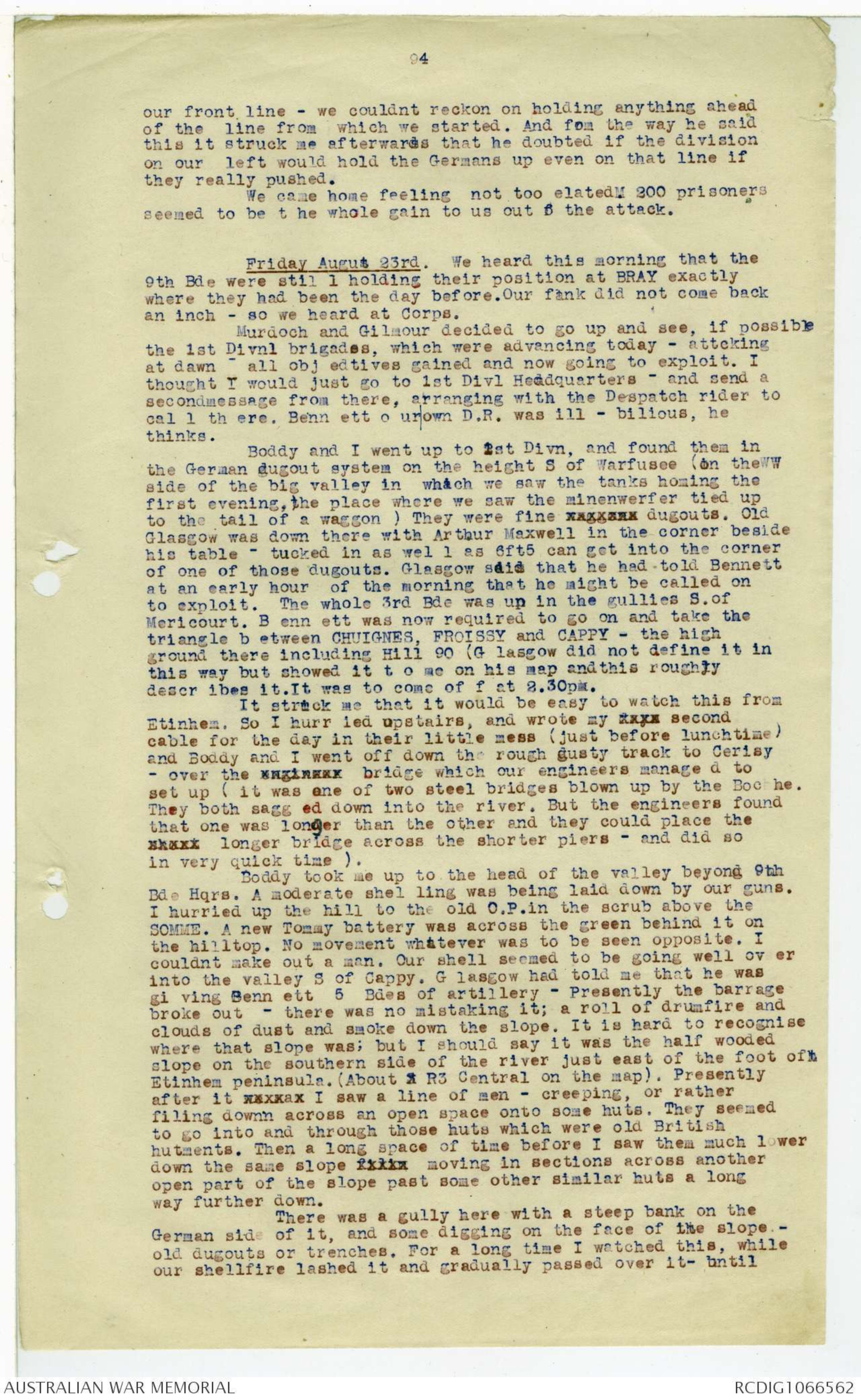
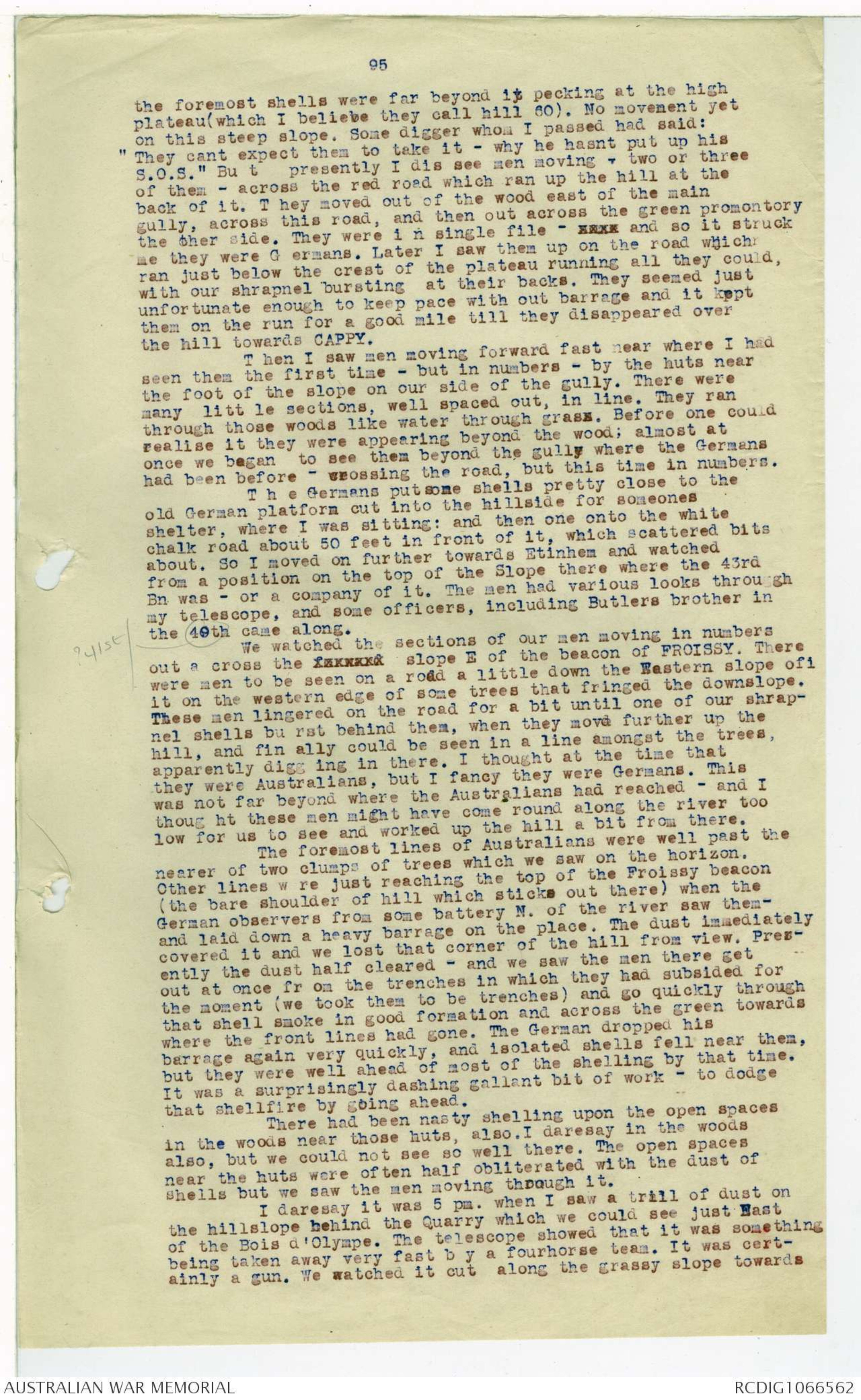
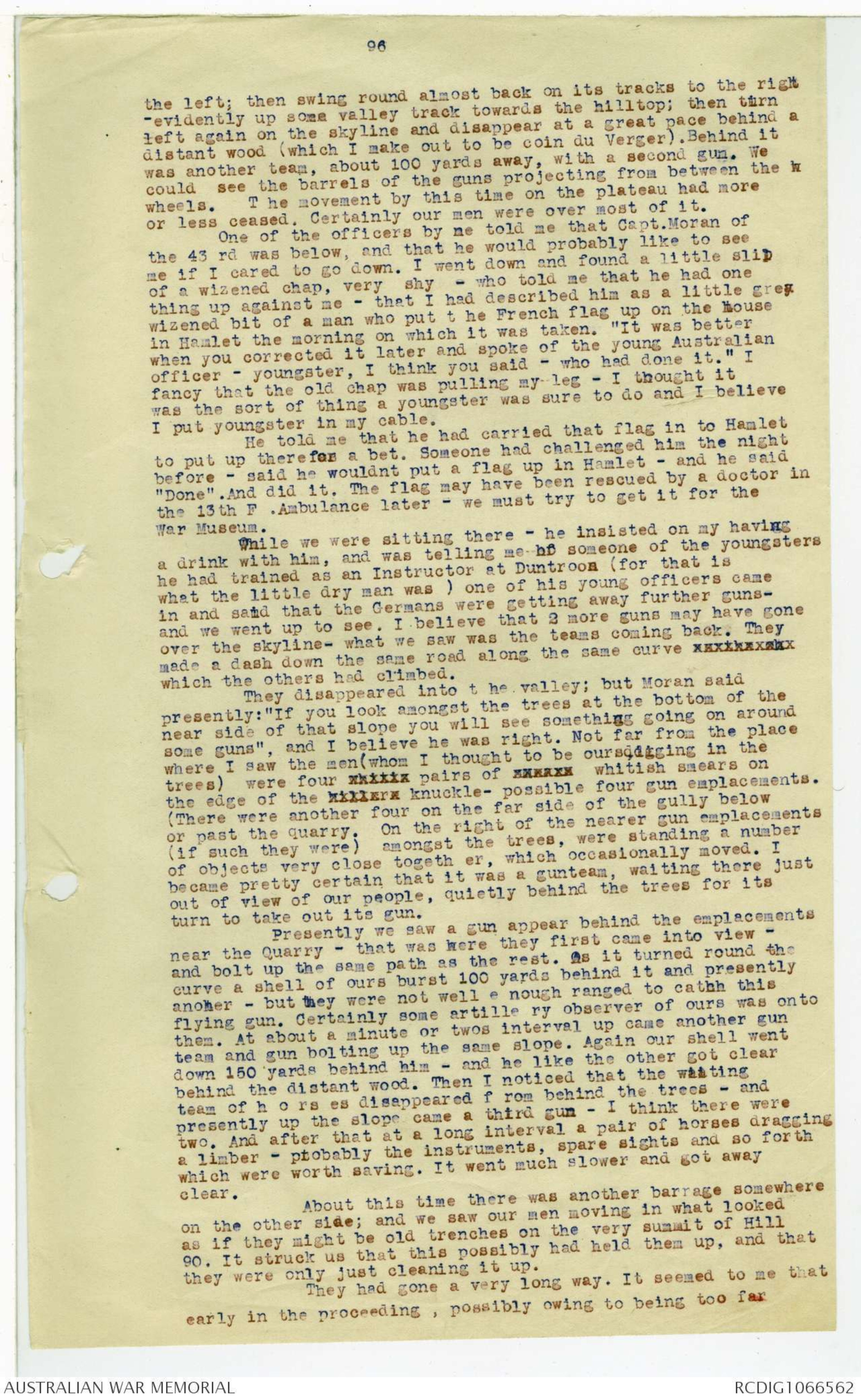
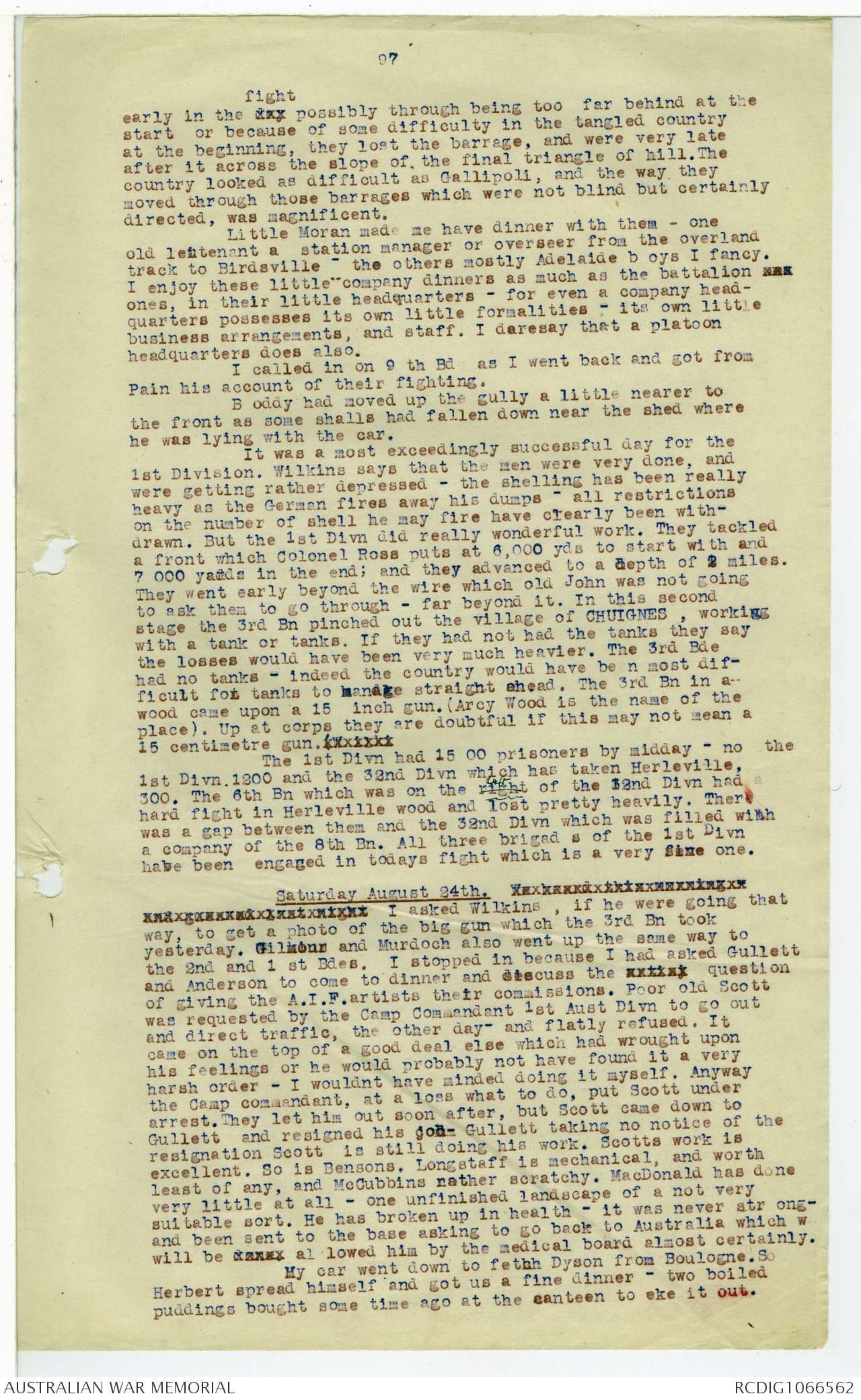
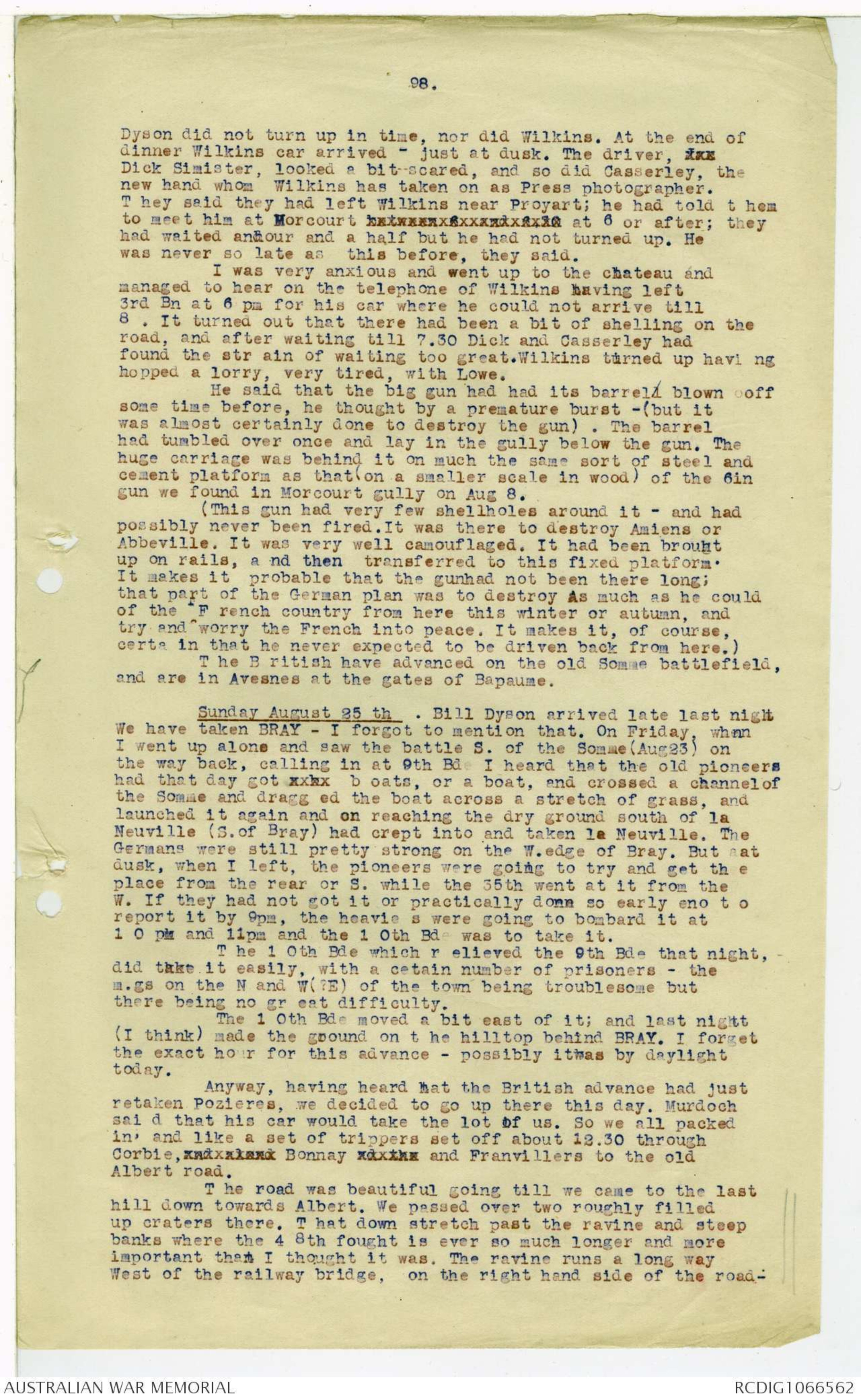
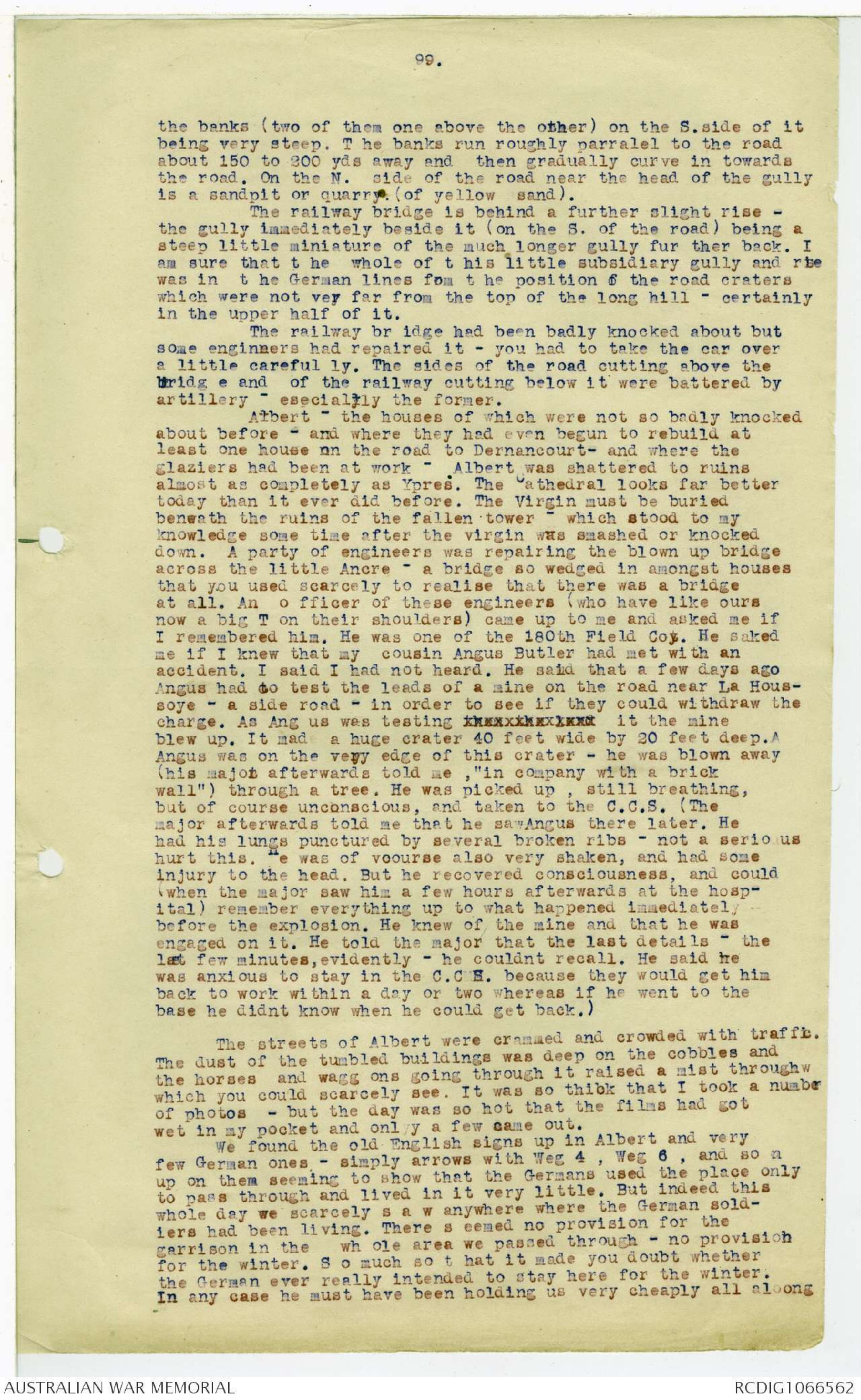
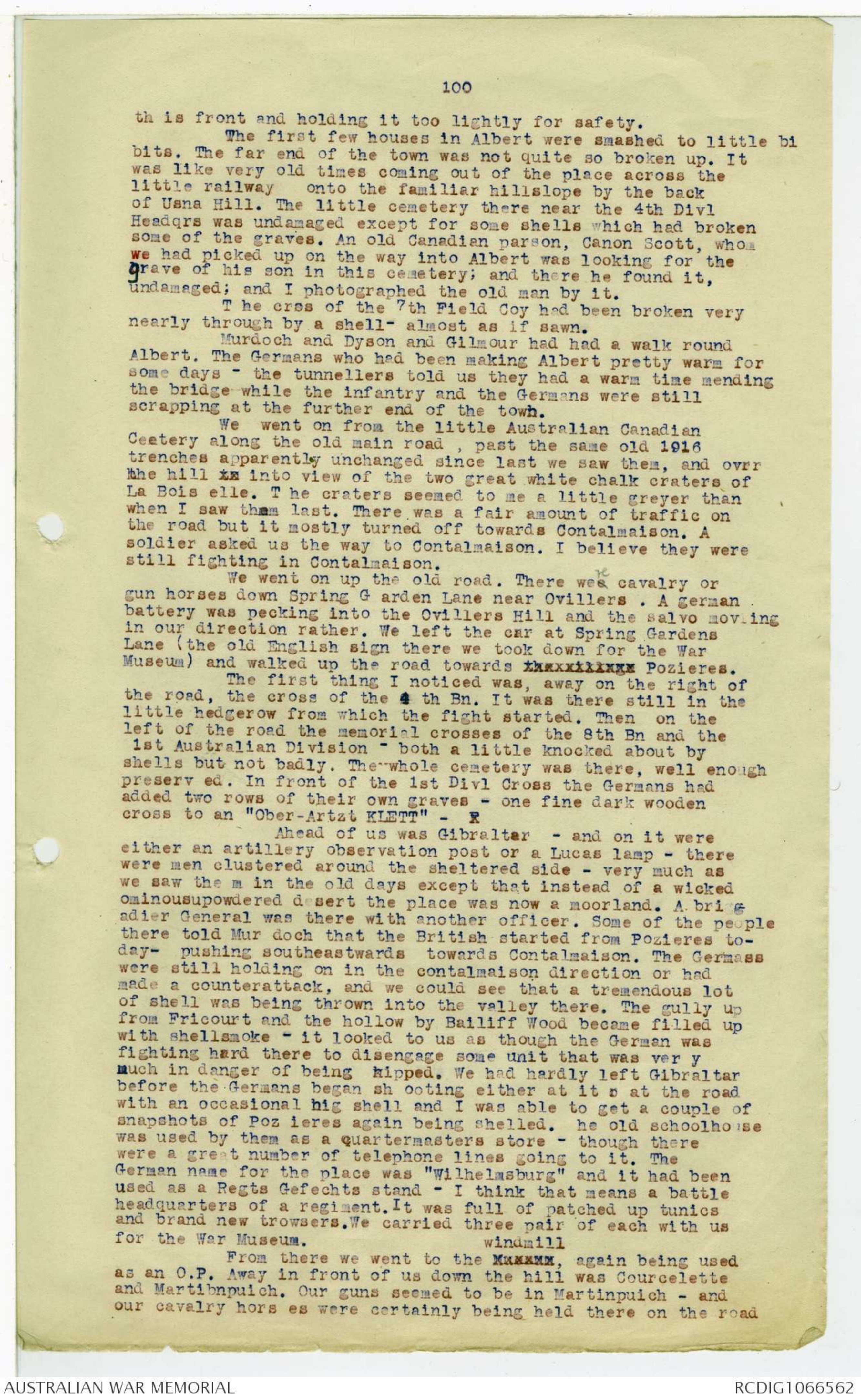
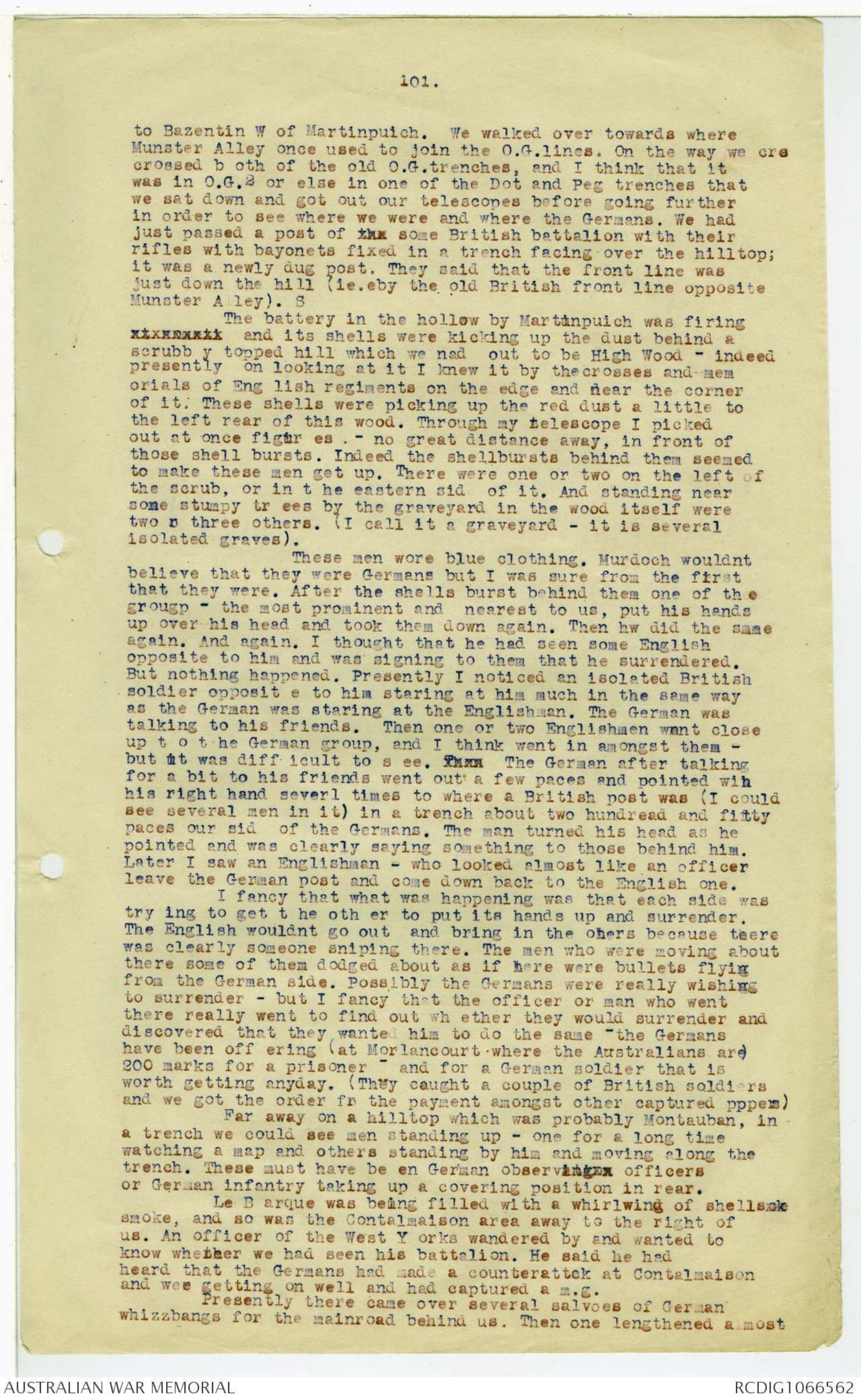
92
and Sergt Lowe. They had been right to the outskirts of BRAY
and had photographed a similar burial of Germans at the Bn
Headquarters down the hill - Moorsheads, I suppose. "You only
had to dodge the machineguns for about 50 yards", Wilkins said.
I went up to the hilltop and found the old line of
unwired little posts which our attack had started from, on
the plateau above Etinhem. The German was firing an occasion al
shell - probably a sniping shot for Wilkins or the burial
party. I walked along t o the trenches overlooking Bray, on the
edge of the Etinhem Peninsula; you cannot see the whole of t he
village from them, because there is a little space between them
and the edge of the xxxxxx cliff which is pretty steep. There
were 3rd Pioneers in these trenches. They had not been shelled
so badly as the little posts of the old front line on top of
the hill - those had been very xxxxx heavily sprinkled with
shell - new shellholes every where.
One could see the top of the steep roofed little Church
of Bray and its tower - both ^stone roofed with slate. They did not
s eem to have been damaged.
I walked towards the dip in the Etinhem peninsula
because you could see from there more of Bray. The pioneers
wanted t o know if some men whom you could see leaving the foot
of the hill opposite, near some old British huts at the NE ennd
of the town, were Germns or British. You could see the men
quite clearly with the naked eye. The telescopes showed that
they were Germans, walking quite unconcerned up the white
road - carrying gas helmet or overcoat in hand - up the
hill. At the top of the hill t hey got off the road and
walked across the grassland to the right where were other
Germans coming towards the N along a sunken road. One the
N of the wh ite road up the hill there ran a zigzag
white chalk trench across the green - which I expect the Germans
s till held pretty strongly.
xxxxxxxx The pioneers in the trench told me they had
lost both their C.Os (Company commander wd, and I dont know
whom they meant b y the other. Col.Sandy, who is getting a
great reputation by the willingness with which he takes on
the work of infantry with his pioneers) had not been wounded
so far as I could hear.)
I walked back towards the Bn Hqrs. As I reached the
road up the hill from Etinhem, where one had seen our patrol
a week before, over came a shell and burst not far from Bn Hqrs
or the bank where it must have been. Presently over came another
closer - and the bits whizzed past at a great spped -swift a
a bullet. I got into a shell hole. The German prisoners had
scattered from the aid post and were taking shelter further
down the bank. Gradually the shelling lengthened and an
Australian called the prisoners together again and brought
them back to the bank. I went back to Hqrs as I didnt know
where Murdoch and Gilmour would be. Col. White was back and
talking to Gilmour; and presently Murdoch, who had been at
the aid post, came in.
White told us the fight as he had seen it - I have
my notes. He clearly thought that if the pace could have been
much quicker and the hapt shorter, his men could have reached
the hill beyond BRAY in their exploitation. But the orders to
exploit arrived late - just before the attack started; the
German barrage (which was laid down heavily before the start)
came down on them during the halt and they had to sit an hour
in their gas masks; and the tropps were "dopey" after that.
By the time they were able to grasp what was wanted of them-
the orders to dig in had to be altered after the objective was
reached and digging in had begun, so far as the men were concerned
- only the officers had received xxxx before the start
the order to exploit - and by the time it could be made clear
to the men, the German machineguns in the village were too
hot to be suppressed without losses larger than were worth facig.
93.
We walked back along the same road as before - past the old
windmill. Murdoch had to go carefully on account of his leg.
It was a glorious afternoon. As we went we noticed that the
German began to throw one or two 5.9 shells into the edge of
the woods on our right. He followed these up by gradually
increasing the shellfire till he was flinging four or five
5.9 shell per minute fair onto the edge of the wooos, working
along slowly from right to left, and gradually converging-
as the edge of the woods did also - with the path along which
we were going. Then there was a chatter of machineguns behind
us. Presently machineguns began to chatter again; and we saw
a number of aeroplanes behind us in the air , wheeling and divig
over some ta r get over the dge of the hill, behind us.
The planes were coming gradually this way. Murdoch or Gilmour
cal led out: "Why, theyve got red bodies". And so they had.
The old Richthofen Circus had red bodies and I fancy that it
still carries them - No1 Pursuit flight, a crack German
flight. Low on the horizon was smoking the edge of a barrage
in the gully - we couldnt just see it. It was clear to me thtt
the Germans were counterattacking. These were the planes with
the c/attack, and the fire on the woods was a fine bit of
counterbattery meant to quieten the guns there; and certainly
the guns were scarcely firing a shot. Away back in the SOMME
valley the bigger guns were shooting fairly regularly - certainly
on a shoot of some sort. But the fieldguns in those
woods didnt seem to be firing at all - I think I remember one
battery going - one could hear the salvoes - but no more. He
was drenching t he guns most effectively
(Blamey told me that the 3ml Corps had 21 guns knoeked
out. They had come over into our territory for their gun
positions and had gone into our old abandoned pits, whereas
our guns were all in new positions specially chosen. We had,
I think he said, only one gun knockked out.)
The red planes came , three of them, for an English
plane which was observing or patrolling near the front line.
They dived at him and I thought they must get him, buthe
got away clear, flying fairly low. They did not chase him far
over our lines. T hey caje along afterwards, however; and we
began to feel pretty naked, standing out there on the platea u.
Two English artillery officers were coming up behind us and
they hu rr i ed over the hill and dropped into a shellhole.
One of the 5.9 shells came uncomfortably close- the bits whizzing
all round us though the shell burst 1O0 yards away. We nipped
into a large shellhole and stayed there till the shelling eased
a little - it was never heavy except on the woodsedge; xx [[we]]
called in at Bde Headquarters,xxxxxxxxxxxxxxxxxxxxxx for our
coats; and then walked to our car (in the quarry at the valleys
end) .Murdochs belt had dropped from his coat which he was
carrying over his arm, in t hat mile from Bde Hqrs to the car ;
we went back over the ground at once but it was gone - a useful
well polished article like that would not lie fifteen minutes
on a roadway in France where the mere fact that an object is
lying about means that it is lost and of course abandoned.
We called in to see G elly as I wanted to tell him
why White had not exploited BRAY - the reasons ; a message h ad
just arrived on the telephone (or rather it was casually mentioned
in conversation - that the Germans had counterattacked -
and driven the 3rd Corps out of their line NW of Bray; that
the 3r d Corps were sending up hanother brigad to retake
their green line - or occupy it. A sergeant took a memo of the
conversation and handed it to G elly, who gave it to me with
a laugh. xxxxxxxxxxxxxxxx As we were talking Jackson, G.S.03
also came up with a pink form containing a telegram from some
one sig ned Hawkley or Hawfey: it ran something like this:
"Send r einforcements quickly" The Germans are getting behind
our left and enfilading our left with machineguns." (I heard
later at 9th Bde Hqrs that this message was considered alarmist.
"Th e fi rst thing when y ou get a mesage like that " said
Pain" is to consider who it is from" and he rather discounted
it in that way). However, G elly clearly thought that if the
Br itish came out of their line we should have to come out of
94
our front line - we couldnt reckon on holding anything ahead
of the line from which we started. And fom the way he said
this it struck me afterwards that he doubted if the division
on our left would hold the Germans up even on that line if
they really pushed.
We came home feeling not too elated. 200 prisoners
seemed to be t he whole gain to us out o the attack.
Friday Augut 23rd. We heard this morning that the
9th Bde were stil l holding their position at BRAY exactly
where they had been the day before. Our flank did not come back
an inch - so we heard at Corps.
Murdoch and Gilmour decided to go up and see, if possible
the 1st Divnl brigades, which were advancing today - attcking
at dawn - all obj edtives gained and now going to exploit. I
thought I would just go to 1st Divl Headquarters - and send a
secondmessage from there, arranging with the Despatch rider to
cal l th ere. Benn ett o ur|own D.R. was ill - bilious, he
thinks.
Boddy and I went up to 1st Divn, and found them in
the German dugout system on the height S of Warfusee (on the W
side of the big valley in which we saw the tanks homing the
first evening, the place where we saw the minenwerfer tied up
to the tail of a waggon ) They were fine xxxxxxx dugouts. Old
Glasgow was down there with Arthur Maxwell in the corner beside
his table - tucked in as wel 1 as 6ft5 can get into the corner
of one of those dugouts. Glasgow said that he had told Bennett
at an early hour of the morning that he might be called on
to exploit. The whole 3rd Bde was up in the gullies S. of
Mericourt. B enn ett was now required to go on and take the
triangle b etween CHUIGNES, FROISSY and CAPPY - the high
ground there including Hill 90 (G lasgow did not define it in
this way but showed it t o me on his map and this roughly
descr ibes it.It was to come of f at 2.30pm.
It struck me that it would be easy to watch this from
Etinhem. So I hurr ied upstairs, and wrote my xxxx second
cable for the day in their little mess (just before lunchtime)
and Boddy and I went off down the rough dusty track to Cerisy
- over the xxxxxxxx bridge which cur engineers manage d to
set up ( it was one of two steel bridges blown up by the Boc he.
They both sagg ed down into the river. But the engineers found
that one was longer than the other and they could place the
xxxxx longer bridge across the shorter piers - and did so
in very quick time ).
Boddy took me up to the head of the valley beyond 9th
Bde Hqrs. A moderate shel ling was being laid down by our guns.
I hurried up the hill to the old O.P.in the scrub above the
SOMME. A new Tommy battery was across the green behind it on
the hilltop. No movement whatever was to be seen opposite. I
couldnt make out a man. Our shell seemed to be going well ov er
into the valley S of Cappy. G lasgow had told me that he was
gi ving Benn ett 5 Bdes of artillery - Presently the barrage
broke out - there was no mistaking it; a roll of drumfire and
clouds of dust and smoke down the slope. It is hard to recognise
where that slope was; but I should say it was the half wooded
slope on the southern side of the river just east of the foot of t
Etinhem peninsula. (About A R3 Central on the map). Presently
after it xxxxxx I saw a line of men - creeping, or rather
filing downn across an open space onto some huts. They seemed
to go into and through those huts which were old British
hutments. Then a long space of time before I saw them much lower
down the same slope xxxxx moving in sections across another
open part of the slope past some other similar huts a long
way further down.
There was a gully here with a steep bank on the
German side of it, and some digging on the face of the slope -
old dugouts or trenches. For a long time I watched this, while
our shellfire lashed it and gradually passed over it- until
95
the foremost shells were far beyond it pecking at the high
plateau(which I believe they call hill 6O). No movement yet
on this steep slope. Some digger whom I passed had said:
"They cant expect them to take it - why he hasnt put up his
S.O.S". B ut presently I dis see men moving - two or three
of them - across the red road which ran up the hill at the
back of it. T hey moved out of the wood east of the main
gully, across this road, and then out across the green promontory
the other side. They were i n single file - xxxx and so it struck
me they were G ermans. Later I saw them up on the road which
ran just below the crest of the plateau running all they could,
with our shrapnel bursting at their backs. They seemed just
unfortunate enough to keep pace with out barrage and it kept
them on the run for a good mile till they disappeared over
the hill towards CAPPY.
T hen I saw men moving forward fast near where I had
seen them the first time - but in numbers - by the huts near
the foot of the slope on our side of the gully. There were
many litt le sections, well spaced out, in line. They ran
through those woods like water through grass. Before one could
realise it they were appearing beyond the wood; almost at
once we began, to see them beyond the gully where the Germans
had been before - crossing the road, but this time in numbers.
T h e Germans put some shells pretty close to the
old German platform cut into the hillside for someones
shelter, where I was sitting: and then one onto the white
chalk road about 50 feet in front of it, which scattered bits
about. So I moved on further towards Etinhem and watched
from a position on the top of the Slope there where the 43rd
Bn was - or a company of it. The men had various looks through
my telescope, and some officers, including Butlers brother in
the 4Oth came along.
[*?41st|*]
We watched the sections of our men moving in numbers
out a cross the xxxxxxx slope E of the beacon of FROISSY. There
were men to be seen on a road a little down the Eastern slope ofi
it on the western edge of some trees that fringed the downslope.
These men lingered on the road for a bit until one of our shrapnel
shells bu rst behind them, when they movd further up the
hill, and fin ally could be seen in a line amongst the trees,
apparently digg ing in there. I thought at the time that
they were Australians, but I fancy they were Germans. This
was not far beyond where the Australians had reached - and I
thoug ht these men might have come round along the river too
low for us to see and worked up the hill a bit from there.
The foremost lines of Australians were well past the
nearer of two clumps of trees which we saw on the horizon.
Other lines w re just reaching the top of the Froissy beacon
(the bare shoulder of hill which sticks out there) when the
German observers from some battery N. of the river saw them -
and laid down a heavy barrage on the place. The dust immediately
covered it and we lost that corner of the hill from view. Presently
the dust half cleared - and we saw the men there get
out at once fr om the trenches in which they had subsided for
the moment (we took them to be trenches) and go quickly through
that shell smoke in good formation and across the green towards
where the front lines had gone. The German dropped his
barrage again very quickly, and isolated shells fell near them,
but they were well ahead of most of the shelling by that time.
It was a surprisingly dashing gallant bit of work - to dodge
that shellfire by going ahead.
There had been nasty shelling upon the open spaces
in the woods near those huts, also. I daresay in the woods
also, but we could not see so well there. The open spaces
near the huts were often half obliterated with the dust of
shells but we saw the men moving through it.
I daresay it was 5 pm. when I saw a trill of dust on
the hillslope behind the Quarry which we could see just East
of the Bois d'Olympe. The telescope showed that it was something
being taken away very fast b y a fourhorse team. It was certainly
a gun. We watched it cut along the grassy slope towards
96
the left; then swing round almost back on its tracks to the right
-evidently up some valley track towards the hilltop; then turn
left again on the skyline and disappear at a great pace behind a
distant wood (which I make out to be coin du Verger). Behind it
was another team, about 100 yards away, with a second gun. We
could see the barrels of the guns projecting from between the x
wheels. T he movement by this time on the plateau had more
or less ceased. Certainly our men were over most of it.
One of the officers by ne told me that Capt.Moran of
the 43 rd was below, and that he would probably like to see
me if I cared to go down. I went down and found a little slip
of a wizened chap, very shy - who told me that he had one
thing up against me - that I had described him as a little grey
wizened bit of a man who put t he French flag up on the house
in Hamlet the morning on which it was taken. “It was better
when you corrected it later and spoke of the young Australian
officer - youngster, I think you said - who had done it." I
fancy that the old chap was pulling my leg - I thought it
was the sort of thing a youngster was sure to do and I believe
I put youngster in my cable.
He told me that he had carried that flag in to Hamlet
to put up therefor a bet. Someone had challenged him the night
before - said he wouldnt put a flag up in Hamlet - and he said
"Done".And did it. The flag may have been rescued by a doctor in
the 13th F .Ambulance later - we must try to get it for the
War Museum.
While we were sitting there - he insisted on my having
a drink with him, and was telling me hf someone of the youngsters
he had trained as an Instructor at Duntroon (for that is
what the little dry man was ) one of his young officers came
in and said that the Germans were getting away further guns-
and we went up to see, I believe that 2 more guns may have gone
over the skyline- what we saw was the teams coming back. They
made a dash down the same road along the same curve xxxxxxxxxx
which the others had climbed.
They disappeared into t he valley; but Moran said
presently: "If you look amongst the trees at the bottom of the
near side of that slope you will see something going on around
some guns", and I believe he was right. Not far from the place
where I saw the men(whom I thought to be oursdigging in the
trees) were four xxxxxx pairs of xxxxxx whitish smears on
the edge of the xxxxxxx knuckle- possible four gun emplacements.
(There were another four on the far side of the gully below
or past the quarry. On the right of the nearer gun emplacements
(if such they were) amongst the trees, were standing a number
of objects very close togeth er, which occasionally moved. I
became pretty certain that it was a gunteam, waiting there just
out of view of our people, quietly behind the trees for its
turn to take out its gun.
Presently we saw a gun appear behind the emplacements
near the Quarry - that was were they first came into view -
and bolt up the same path as the rest. As it turned round the
curve a shell of ours burst 100 yards behind it and presently
anoher - but they were not well e nough ranged to catch this
flying gun. Certainly some artille ry observer of ours was onto
them. At about a minute or twos interval up came another gun
team and gun bolting up the same slope. Again our shell went
down 150 yards behind him - and he like the other got clear
behind the distant wood. Then I noticed that the waiting
team of h o rs es disappeared f rom behind the trees - and
presently up the slope came a third gun - I think there were
two. And after that at a long interval a pair of horses dragging
a limber - probably the instruments, spare sights and so forth
which were worth saving. It went much slower and got away
clear.
About this time there was another barrage somewhere
on the other side; and we saw our men moving in what looked
as if they might be old trenches on the very summit of Hill
90. It struck us that this possibly had held them up, and that
they were only just cleaning it up.
They had gone a very long way. It seemed to me that
early in the proceeding , possibly owing to being too far
97
fight
early in the ∧ possibly through being too far behind at the
start or because of some difficulty in the tangled country
at the beginning, they lost the barrage, and were very late
after it across the slope of. the final triangle of hill. The
country looked as difficult as Gallipoli, and the way they
moved through those barrages which were not blind but certainly
directed, was magnificent.
Little Moran made me have dinner with them - one
old leutenant a station manager or overseer from the overland
track to Birdsville, the others mostly Adelaide b oys I fancy.
I enjoy these little "company dinners as much as the battalion xxx
ones, in their little headquarters - for even a company headquarters
possesses its own little formalities , its own little
business arrangements, and staff. I daresay that a platoon
headquarters does also.
I called in on 9 th Bd as I went back and got from
Pain his account of their fighting.
B oddy had moved up the gully a little nearer to
the front as some shells had fallen down near the shed where
he was lying with the car.
It was a most exceedingly successful day for the
1st Division. Wilkins says that the men were very done, and
were getting rather depressed - the shelling has been really
heavy as the German fires away his dumps " all restrictions
on the number of shell he may fire have clearly been withdrawn.
But the 1st Divn did really wonderful work. They tackled
a front which Colonel Ross puts at 6,000 yds to start with and
7 000 yards in the end; and they advanced to a depth of 2 miles.
They went early beyond the wire which old John was not going
to ask them to go through - far beyond it. In this second
stage the 3rd Bn pinched out the village of CHUIGNES, working
with a tank or tanks. If they had not had the tanks they say
the losses would have been very much heavier. The 3rd Bde
had no tanks - indeed the country would have be n most difficult
for tanks to manage straight ahead. The 3rd Bn in a-
wood came upon a 15 inch gun. (Arcy Wood is the name of the
place). Up at corps they are doubtful if this may not mean a
15 centimetre gun. xxxxxxx
The 1st Divn had 15 00 prisoners by midday - no the
1st Divn.1200 and the 32nd Divn which has taken Herleville,
300. The 6th Bn which was on the right (xxd out - corrected to 'left') of the 32nd Divn had
hard fight in Herleville wood and lost pretty heavily. There
was a gap between them and the 32nd Divn which was filled with
a company of the 8th Bn. All three brigad s of the 1st Divn
have been engaged in todays fight which is a very fine one.
Saturday August 24th. xxxxxxzxx
xxxxxxxxxxxxxxxxxxx I asked Wilkins, if he were going that
way, to get a photo of the big gun which the 3rd Bn took
yesterday. Gilmour and Murdoch also went up the same way to
the 2nd and 1 st Bdes. I stopped in because I had asked Gullett
and Anderson to come to dinner and discuss the xxxxxx question
of giving the A.I.F. artists their commissions. Poor old Scott
was requested by the Camp Commandant 1st Aust Divn to go out
and direct traffic, the other day- and flatly refused. It
came on the top of a good deal else which had wrought upon
his feelings or he would probably not have found it a very
harsh order - I wouldnt have minded doing it myself. Anyway
the Camp commandant, at a loss what to do, put Scott under
arrest. They let him out soon after, but Scott came down to
Gullett, and resigned his job- Gullett taking no notice of the
resignation Scott is still doing his work. Scotts work is
excellent. So is Bensons, Longstaff is mechanical, and worth
least of any, and McCubbins rather scratchy. MacDonald has done
very little at all - one unfinished landscape of a not very
suitable sort. He has broken up in health - it was never str ong -
and been sent to the base asking to go back to Australia which w
will be xxxxx al lowed him by the medical board almost certainly.
My car went down to fetch Dyson from Boulogne. So
Herbert spread himself and got us a fine dinner - two boiled
puddings bought some time ago at the canteen to eke it out.
98.
Dyson did not turn up in time, nor did Wilkins. At the end of
dinner Wilkins car arrived - just at dusk. The driver, xxx
Dick Simister, looked a bit-scared, and so did Casserley, the
new hand whom Wilkins has taken on as Press photographer.
They said they had left Wilkins near Proyart; he had told t hem
to meet him at Morcourt xxxxxxxxxxxxx at 6 or after; they
had waited an hour and a half but he had not turned up. He
was never so late as this before, they said.
I was very anxious and went up to the chateau and
managed to hear on the telephone of Wilkins having left
3rd Bn at 6 pm for his car where he could not arrive till
8 . It turned out that there had been a bit of shelling on the
road, and after waiting till 7.30 Dick and Casserley had
found the str ain of waiting too great.Wilkins turned up havi ng
hopped a lorry, very tired, with Lowe.
He said that the big gun had had its barrell blown off
some time before, he thought by a premature burst -(but it
was almost certainly done to destroy the gun). The barrel
had tumbled over once and lay in the gully below the gun. The
huge carriage was behind it on much the same sort of steel and
cement platform as that (on a smaller scale in wood) of the 6in
gun we found in Morcourt gully on Aug 8.
(This gun had very few shellholes around it - and had
possibly never been fired. It was there to destroy Amiens or
Abbeville. It was very well camouflaged. It had been brought
up on rails, a nd then transferred to this fixed platform.
It makes it probable that the gunhad not been there long;
that part of the German plan was to destroy As much as he could
of the French country from here this winter or autumn, and
try and worry the French into peace. It makes it, of course,
certa in that he never expected to be driven back from here.)
T he B ritish have advanced on the old Somme battlefield,
and are in Avesnes at the gates of Bapaume.
Sunday August 25 th. Bill Dyson arrived late last night.
We have taken BRAY - I forgot to mention that. On Friday, when
I went up alone and saw the battle S. of the Somme (Aug23) on
the way back, calling in at 9th Bde I heard that the old pioneers
had that day got xxxx b oats, or a boat, and crossed a channel of
the Somme and dragg ed the boat across a stretch of grass, and
launched it again and on reaching the dry ground south of la
Neuville (S.of Bray) had crept into and taken le Neuville. The
Germans were still pretty strong on the W.edge of Bray. But at
dusk, when I left, the pioneers were going to try and get th e
place from the rear or S. while the 35th went at it from the
W. If they had not got it or practically donn so early eno t o
report it by 9pm, the heavie s were going to bombard it at
1 0 pm and 11pm and the 1 0th Bde was to take it.
T he 10th Bde which r elieved the 9th Bde that night,
did take it easily, with a cetain number of prisoners - the
m.gs on the N and W(?E) of the town being troublesome but
there being no gr eat difficulty.
The 1 0th Bde moved a bit east of it; and last night
(I think) made the ground on t he hilltop behind BRAY. I forget
the exact hour for this advance - possibly itwas by daylight
today.
Anyway, having heard hat the British advance had just
retaken Pozieres, we decided to go up there this day. Murdoch
sai d that his car would take the lot of us. So we all packed
in' and like a set of trippers set off about 12.30 through
Corbie, xxxxxxxxx Bonnay xxxxxx and Franvillers to the old
Albert road.
T he road was beautiful going till we came to the last
hill down towards Albert. We passed over two roughly filled
up craters there. T hat down stretch past the ravine and steep
banks where the 4 8th fought is ever so much longer and more
important then I thought it was. The ravine runs a long way
West of the railway bridge, on the right hand side of the road-
99.
the banks (two of them one above the other) on the S.side of it
being very steep. T he banks run roughly parralel to the road
about 150 to 200 yds away and then gradually curve in towards
the road. On the N. side of the road near the head of the gully
is a sandpit or quarry (of yellow sand).
The railway bridge is behind a further slight rise -
the gully immediately beside it (on the S. of the road) being a
steep little miniature of the much longer gully fur ther back. I
am sure that t he whole of t his little subsidiary gully and rie
was in t he German lines fom t he position of the road craters
which were not vey far from the top of the long hill - certainly
in the upper half of it.
The railway br idge had been badly knocked about but
some engineers had repaired it - you had to take the car over
a little careful ly. The sides of the road cutting above the
bridg e and of the railway cutting below it were battered by
artillery - eseciallly the former.
Albert - the houses of which were not so badly knocked
about before - and where they had even begun to rebuild at
least one house on the road to Dernancourt- and where the
glaziers had been at work - Albert was shattered to ruins
almost as completely as Ypres. The Cathedral looks far better
today than it ever did before. The Virgin must be buried
beneath the ruins of the fallen tower - which stood to my
knowledge some time after the virgin was smashed or knocked
down. A party of engineers was repairing the blown up bridge
across the little Ancre - a bridge so wedged in amongst houses
that you used scarcely to realise that there was a bridge
at all. An o fficer of these engineers (who have like ours
now a big T on their shoulders) came up to me and asked me if
I remembered him. He was one of the 180th Field Coy. He asked
me if I knew that my cousin Angus Butler had met with an
accident, I said I had not heard. He said that a few days ago
Angus had to test the leads of a mine on the road near La Houssoye
- a side road - in order to see if they could withdraw the
charge. As Ang us was testing xxxxxxxxxxx it the mine
blew up. It made a huge crater 40 feet wide by 20 feet deep. A
Angus was on the very edge of this crater - he was blown away
(his major afterwards told me ,"in company with a brick
wall") through a tree. He was picked up, still breathing,
but of course unconscious, and taken to the C.C.S. (The
major afterwards told me that he sawAngus there later. He
had his lungs punctured by several broken ribs - not a serio us
hurt this. He was of vcourse also very shaken, and had some
injury to the head, But he recovered consciousness, and could
(when the major saw him a few hours afterwards at the hospital)
remember everything up to what happened immediately
before the explosion. He knew of the mine and that he was
engaged on it. He told the major that the last details - the
last few minutes, evidently - he couldnt recall. He said he
was anxious to stay in the C.C[[H]]. because they would get him
back to work within a day or two whereas if he went to the
base he didnt know when he could get back.)
The streets of Albert were crammed and crowded with traffic.
The dust of the tumbled buildings was deep on the cobbles and
the horses, and wagg ons going through it raised a mist through w
which you could scarcely see. It was so thick that I took a number
of photos - but the day was so hot that the films had got
wet in my pocket and onl y a few came out.
We found the old English signs up in Albert and very
few German ones - simply arrows with Weg 4, Weg 6, and so n
up on them seeming to show that the Germans used the place only
to pass through and lived in it very little. But indeed this
whole day we scarcely s a w anywhere where the German soldiers
had been living. There s eemed no provision for the
garrison in the wh ole area we passed through - no provision
for the winter. S o much so t hat it made you doubt whether
the German ever really intended to stay here for the winter.
In any case he must have been holding us very cheaply all aloong
100
th is front and holding it too lightly for safety.
The first few houses in Albert were smashed to little bi
bits. The far end of the town was not quite so broken up. It
was like very old times coming out of the place across the
little railway onto the familiar hillslope by the back
of Usna Hill. The little cemetery there near the 4th Divl
Headqrs was undamaged except for some shells which had broken
some of the graves. An old Canadian parson, Canon Scott, whom
we had picked up on the way into Albert was looking for the
grave of his son in this cemetery; and there he found it,
undamaged; and I photographed the old man by it.
T he cros of the 7th Field Coy had been broken very
nearly through by a shell- almost as if sawn.
Murdoch and Dyson and Gilmour had had a walk round
Albert. The Germans who had been making Albert pretty warm for
some days - the tunnellers told us they had a warm time mending
the bridge while the infantry and the Germans were still
scrapping at the further end of the town.
We went on from the little Australian Canadian
Ceetery along the old main road, past the same old 1916
trenches apparently unchanged since last we saw them, and over
the hill xx into view of the two great white chalk craters of
La Bois elle. T he craters seemed to me a little greyer than
when I saw them last. There was a fair amount of traffic on
the road but it mostly turned off towards Contalmaison. A
soldier asked us the way to Contalmaison. I believe they were
still fighting in Contalmaison.
We went on up the old road. There we (hand written correction 'were') cavalry or
gun horses down Spring G arden Lane near Ovillers. A german
battery was pecking into the Ovillers Hill and the salvo mov ing
in our direction rather. We left the car at Spring Gardens
Lane (the old English sign there we took down for the War
Museum) and walked up the road towards xxxxxxxxxxxx Pozieres.
The first thing I noticed was, away on the right of
the road, the cross of the [[?4}} th Bn. It was there still in the
little hedgerow from which the fight started. Then on the
left of the road the memorial crosses of the 8th Bn and the
1st Australian Division - both a little knocked about by
shells but not badly. The whole cemetery was there, well enough
preserv ed. In front of the 1st Divl Cross the Germans had
added two rows of their own graves - one fine dark wooden
cross to an "Ober-Artzt KLETT" - X
Ahead of us was Gibralter - and on it were
either an artillery observation post or a Lucas lamp - there
were men clustered around the sheltered side - very much as
we saw the m in the old days except that instead of a wicked
ominousupowdered desert the place was now a moorland. A brigadier
General was there with another officer. Some of the people
there told Mur doch that the British started from Pozieres today-
pushing southeastwards towards Contalmaison. The Germass
were still holding on in the contalmaison direction or had
made a counterattack, and we could see that a tremendous lot
of shell was being thrown into the valley there. The gully up
from Fricourt and the hollow by Bailiff Wood became filled up
with shellsmoke - it looked to us as though the German was
fighting hard there to disengage some unit that was ver y
much in danger of being skipped. We had hardly left Gibraltar
before the Germans began sh ooting either at it o at the road
with an occasional big shell and I was able to get a couple of
snapshots of Poz ieres again being shelled. he old schoolhouse
was used by them as a quartermasters store - though there
were a great number of telephone lines going to it. The
German name for the place was "Wilhelmsburg" and it had been
used as a Regts Gefechts stand - I think that means a battle
headquarters of a regiment. It was full of patched up tunics
and brand new trowsers.We carried three pair of each with us
for the War Museum.
windmill
From there we went to the ∧xxxxxx, again being used
as an O.P. Away in front of us down the hill was Courcelette
and Martibnpuich. Our guns seemed to be in Martinpuich - and
our cavalry hors es were certainly being held there on the road
101.
to Bazentin W of Martinpuich. We walked over towards where
Munster Alley once used to join the O.G.lines. On the way we cro
crossed b oth of the old O.G.trenches, and I think that it
was in O.G.2 or else in one of the Dot and Peg trenches that
we sat down and got out our telescopes before going further
in order to see where we were and where the Germans. We had
just passed a post of xxx some British battalion with their
rifles with bayonets fixed in a trench facing over the hilltop;
it was a newly dug post. They said that the front line was
just down the hill (ie.eby the old British front line opposite
Munster Alley). S
The battery in the hollow by Martinpuich was firing
xxxxxxxxx and its shells were kicking up the dust behind a
scrubb y topped hill which we nad out to be High Wood - indeed
presently, on looking at it I knew it by thecrosses and memorials
of Eng lish regiments on the edge and near the corner
of it. These shells were picking up the red dust a little to
the left rear of this wood. Through my telescope I picked
out at once figur es - no great distance away, in front of
those shell bursts. Indeed the shellbursts behind them seemed
to make these men get up. There were one or two on the left of
the scrub, or in t he eastern sid of it. And standing near
sone stumpy tr ees by the graveyard in the wood itself were
two or three others. (I call it a graveyard - it is several
isolated graves)
These men wore blue clothing. Murdoch wouldnt
believe that they were Germans but I was sure from the first
that they were. After the shells burst behind them one of the
grougp - the most prominent and nearest to us, put his hands
up over his head and took them down again. Then hw did the same
again. And again. I thought that he had seen some English
opposite to him and was signing to them that he surrendered.
But nothing happened. Presently I noticed an isolated British
soldier opposit e to him staring at him much in the same way
as the German was staring at the Englishman. The German was
talking to his friends. Then one or two Englishmen went close
up t o t he German group, and I think went in amongst them -
but it was diff icult to s ee. xxxx The German after talking
for a bit to his friends went out a few paces and pointed wih
his right hand severl times to where a British post was (I could
see several men in it) in a trench about two hundread and fitty
paces our sid of the Germans. The man turned his head as he
pointed and was clearly saying something to those behind him.
Later I saw an Englishman - who looked almost like an officer
leave the German post and come down back to the English one.
I fancy that what was happening was that each side was
try ing to get t he oth er to put its hands up and surrender.
The English wouldnt go out and bring in the ohers because there
was clearly someone sniping there. The men who were moving about
there some of them dodged about as if here were bullets flying
from the German side. Possibly the Germans were really wishing
to surrender - but I fancy that the officer or man who went
there really went to find out wh ether they would surrender and
discovered that they wanted him to do the same - the Germans
have been off ering (at Morlancourt where the Australians are)
200 marks for a prisoner and for a German soldier that is
worth getting anyday. (They caught a couple of British soldiers
and we got the order fr the payment amongst other captured ppper)
Far away on a hilltop which was probably Montauban, in
a trench we could see men standing up - one for a long time
watching a map and others standing by him and moving along the
trench. These must have be en German observingxx officers
or German infantry taking up a covering position in rear.
Le B arque was being filled with a whirlwind of shellsxx
smoke, and so was the Contalmaison area away to the right of
us. An officer of the West Y orks wandered by and wanted to
know whether we had seen his battalion. He said he had
heard that the Germans had made a counterattck at Contalmaison
and wer getting on well and had captured a m.g.
Presently there came over several salvoes of German
whizzbangs for the mainroad behind us. Then one lengthened almost
 Kym Mc
Kym McThis transcription item is now locked to you for editing. To release the lock either Save your changes or Cancel.
This lock will be automatically released after 60 minutes of inactivity.